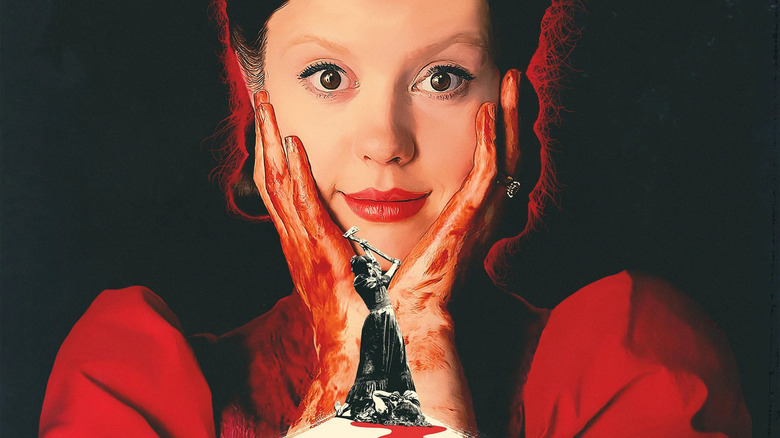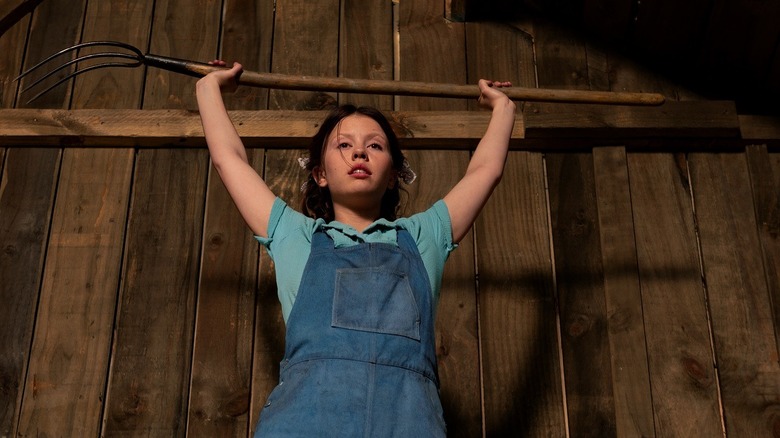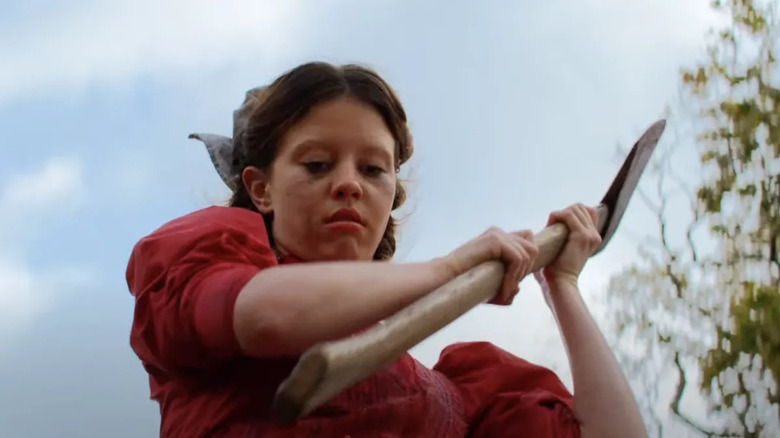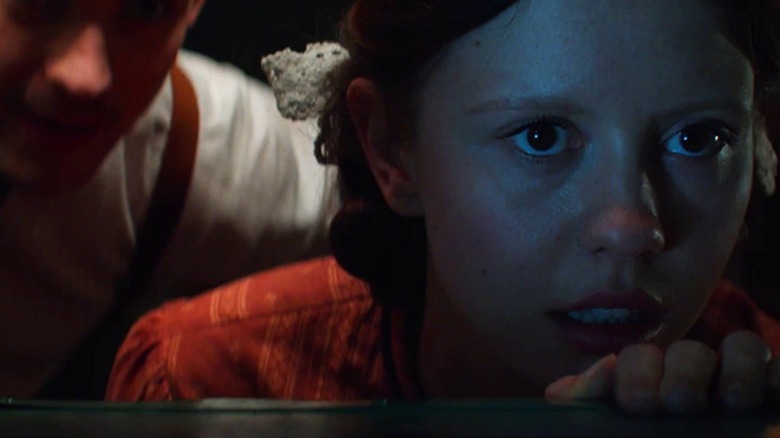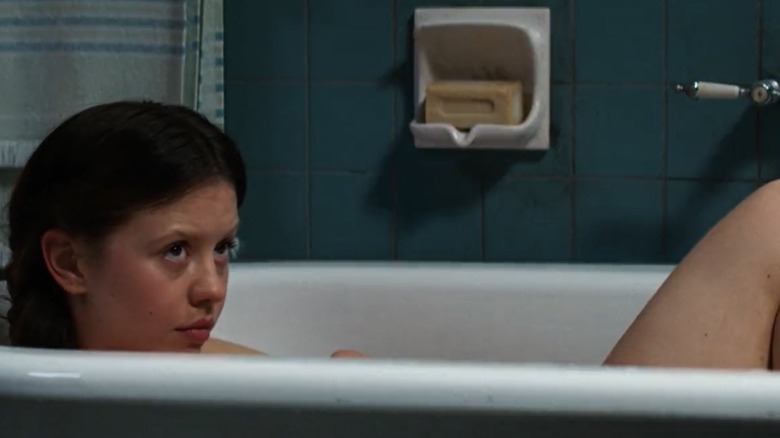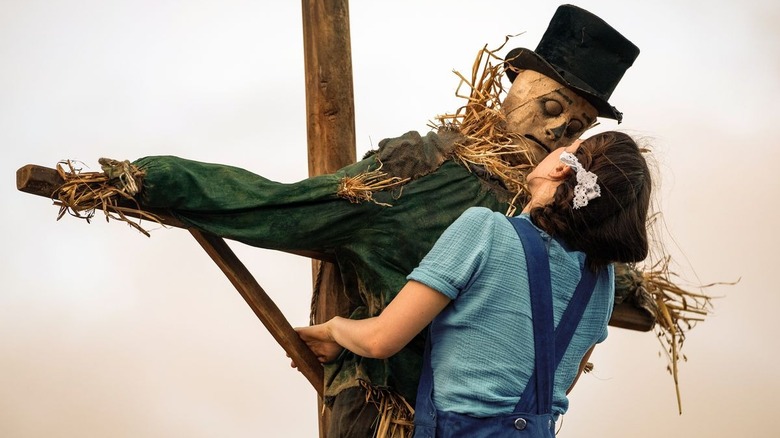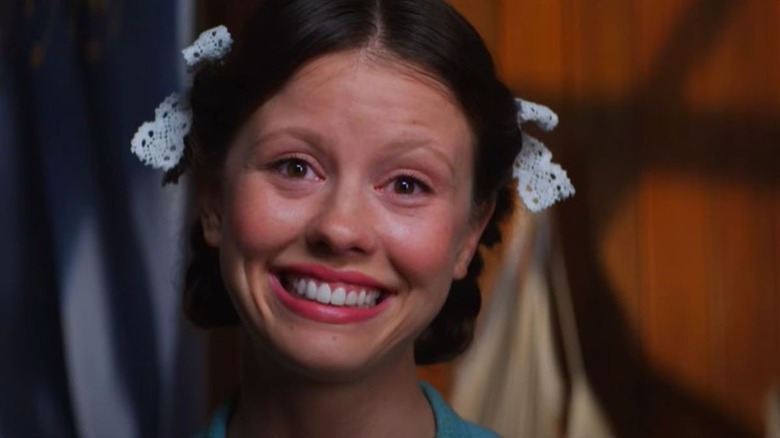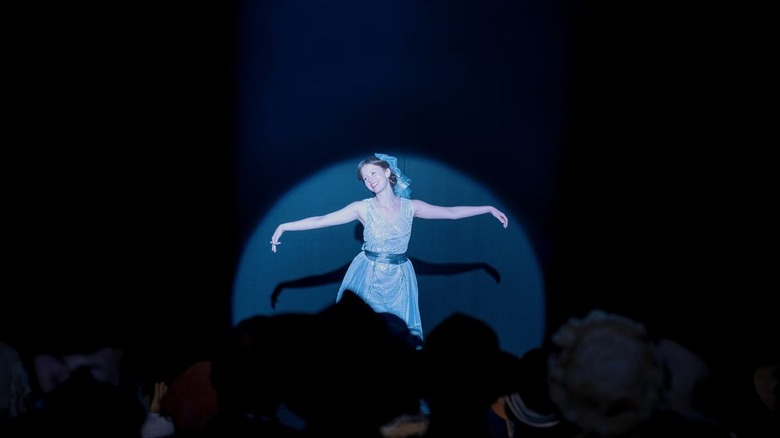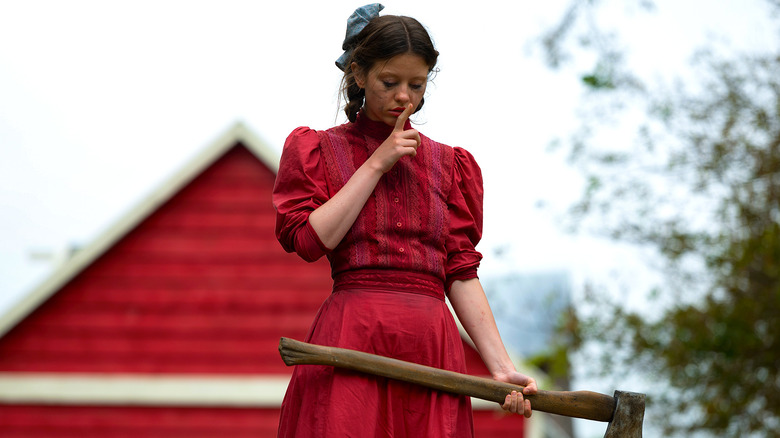Ti West Talks Pearl, Mia Goth's Mesmerizing Performance, And The Horror Of Ambition [Exclusive Interview]
This interview contains spoilers for "Pearl" and "X."
When A24 announced that director Ti West ("House of the Devil," "The Sacrament," "The Innkeepers") would be returning to the horror sphere with the 1970s-set slasher film "X," fans could not contain their excitement. To sweeten the deal, almost immediately after "X" was scaring up audiences and becoming an early front-runner for "Best Horror of 2022," A24 announced that the prequel film "Pearl" was coming by the end of the year.
"X" followed a group of filmmakers attempting to shoot an adult film in a rural Texas farmhouse they've rented from a reclusive couple, only to find themselves in a fight for survival after their work is uncovered by the elderly pair. Mia Goth played dual roles as the budding porn star Maxine Minx and donned prosthetics to play the psycho-biddy, Pearl. In the new prequel film, Goth returns to play the young, ambitious Pearl, providing an insight into what motivated the events of "X" all those years later. It's wise to never underestimate West, as he waited until after the Venice International Film Festival screenings of "Pearl" to announce that the series would be a trilogy, with Goth again returning in the "X" sequel film "MaXXXine."
The collaboration of West and Goth is shaping up to be the greatest genre film partnership since David Lynch and Laura Dern, and I was fortunate enough to chat with West about how "Pearl" came to be, finding a muse in Mia Goth, and what it takes to make an audience feel sympathetic toward a killer.
'They're two different characters, but kind of the same person.'
Is there a greater meaning to the fact that Maxine and Pearl look exactly alike? Or is their similar appearances a more metaphorical representation of how sexual liberation can be met with horror?
I think it's a little bit of both. I don't know if it's more the former, but to speak to the former is to say, Mia and I, when we were making "X," part of the reason why I wanted her to play both roles was we always thought of it as, "They're two different characters, but kind of the same person." That was always interesting to me in making "X," prior to even knowing we were going to make "Pearl." I thought that it conceptually was really appealing.
"X" was very craft-driven for me, and I wanted to put the craft that people that make movies on display, special effects makeup being one of them, and performance being one of them. Just conceptually, that idea seemed to fit the movie, and I didn't know if we'd be able to do it until I met Mia. All that just seemed like an interesting challenge.
Then, if you don't know, at the end of the movie you realize that there's this great bonus to the movie of, "Wait, what?" That just all seemed to be compelling. I knew that we were probably, maybe going to try to make "Pearl," and if we would do this in "X," it would make sense by going back, and it's still Mia playing the same person. It was just a big swing that could have gone one or two ways, and I'm quite thankful. I think that we pulled it off and most of that credit is to Mia.
'Do what you think is best for the movie'
She's pretty unbelievable in both films, just delivering remarkable performances. "X" obviously has this very "Texas Chain Saw Massacre" aesthetic to it given the time period but I'm curious what made you gravitate towards this Golden Age of musical theater and the 1930s Technicolor, even though the film is set in 1918. Was there a reason for this aesthetic, versus what a movie would have looked like in the 1910s?
Well, for one, a movie in the 1910s would have more or less been in a silent film. As brave as A24 and I are, we weren't that brave, but I wanted to commit to a very specific choice of an aesthetic, so that it felt very far removed from "X," and we felt, in a different person's world, so it wasn't just more "X." And in going backwards, "X," is very much a movie that's about how cinema is affecting people. In a way, it's about this sort of independent auteurish filmmaking, and whatnot. The filmmaking before, silent movies aside, the Golden Age of Hollywood also matches the glitz and glamor of what the movies and the pictures represent, and how your life can change, and how glamorous and wonderful your life can be. That felt in line with what Pearl's story was, so that made sense.
When we first came up with the idea, for about a weekend, I was trying to find ways to make it as inexpensive as possible, to get the okay to even make it. One way to do that would be maybe to do it in black and white, in a German Expressionist kind of way, because I knew that the mother was German, and things like that. Then that would have been a heavy black and white aesthetic, with big, dark shadows that we conceivably would even paint.
The benefit of that was that if a wall that we did for "X," was green or something, we didn't really have to repaint it, because it was just going to be gray. So the prep time would have been much easier and much shorter. Credit to A24, they were like, "Well, if one of the driving reasons to make it black and white is because you're trying to find every cheap reason possible to get us to say yes, don't worry about that. Should it be in black and white?"
"Malcolm and Marie" had just come out, "The Tragedy of Macbeth" was being made, "The Lighthouse" ... there was enough movies there, where it was like, "They make black and white movies, they would have made this one." But it made me think, "Well, then, we could go the other direction, and go very colorful. It's just going to cost a few bucks more." And it wasn't crazy more. But when you're trying to get someone to greenlight a second movie, when you haven't even made the first one, you're looking for every single way to make it the easiest yes possible. And credit to them, they were like, "No, no, no, just do what you think is best for the movie." We went the childish, almost Disney-like way, with a more adult and demented subject matter, which felt like a fun contrast to me.
Pearl features an authentic stag film
Oh, yeah. The juxtaposition is just beautiful. Love it.
And it felt original, to be honest. It was like, if there was a Bergman-y version of this script, you could imagine it, because you could imagine the weight of it. But it was just a more original and exciting idea to think of it. We didn't quite go as far as animated animals, but we considered it, you know what I mean? It was, "How far can we go?"
Speaking of the options of black and white, is the stag movie The Projectionist shows Pearl an authentic stag movie or did you make one?
It is a real one.
Oh, I love that. That's even better.
It was called "A Free Ride," aka "Grass Sandwich." If I'm correct on this, and it's been a little while, I'm pretty sure it's the first one, I don't know if it's the first one ever, but it's one of the first ones that has been archived.
On making a pandemic movie without COVID-19
Fantastic. What a great get. With the story also having this backdrop of the 1918 influenza pandemic, was that something that was just authentic to the story? Or was that a response to what was going on during the time of production?
It was both, but it was probably more the latter, only because when we made "X," it was peak pandemic. We were going to New Zealand, where there was not a pandemic happening, and we had to spend two weeks of mandatory quarantine at the hotels before you get into the country, which is where 90% of "Pearl" was written. It just seemed like a topical way to make a movie that tapped into COVID, without being about COVID. Weirdly, also, when I did the math of going, "Well, what would a younger Pearl be," and you reduced the clock, the ideal date happened to be 1919.
I was like, "We should go one more year," because 60 years is what I was thinking, and it's like, that's 1919, but one year earlier, there's all of this interesting, modern, contextualized things. It kind of came out of both the math, and the topical stuff we were going through at the time, and it also just felt like a good backdrop for her situation. Because isolation, and feeling like you want to be somewhere else, was a big part of the storyline.
The Pearl and X factors
I loved "X," don't get me wrong, but after watching "Pearl," I have a greater appreciation for it. How do you feel Pearl's story changes, if an audience member decides to watch "Pearl" before "X?"
I don't know. I mean, this is one of these things that's like, we're going to figure this out in real time. We're going to do a double feature with the New Beverly, and "Pearl" plays first. I don't know what that'll be like versus dealing with an alternative order, because it would just have to happen. When we were making "Pearl," the idea was that it's like, "Sure, it's a prequel," but that it could stand on its own.
You don't have to see "X" to like "Pearl," it enriches it if you do. And you don't have to see "Pearl" to like "X," but it enriches it if you do. But it was always meant to be standalone movies, That it's like "Manhunter" and "The Silence of the Lambs." There's three "Silence of the Lambs” movies, and Hannibal Lecter is the through line, but they're not directly connected. That's, in a way, how I thought about it. I'm optimistic that people will come see "Pearl," who maybe were like, "Oof, 'X,' porn slasher, that's too much for me." But then, they'd see "Pearl" and be, "Oh, but this was right up my alley." So, in many ways, hopefully, it broadens it for people. Or it brings people in to watch "X" that maybe they wouldn't have, because now they have a new interest in it.
I desperately want to meet the person that was, "Ooh, porn, 'X,' that's too much for me," But "Yes, girl dry humping a scarecrow? That's for me." I want to know that person.
They're out there. [laughs]
On Mia Goth's amazing monologue
We talked a little about how Mia Goth is incredible, and she's in every scene in this whole movie. What was it like shooting that end monologue? Did you have safety coverage or was it trusting the process of her unbelievable delivery?
It was mostly that, because there's nothing else really going on in that shot, other than her, and it's quite long. I mean, we did shoot it several times. I'm not 100% sure, but I want to say the fourth take is the one that's in the movie. She made it through every take. They were all in their own, interesting way. For whatever reason, the fourth one just seemed to be the one that was the best, or the most, like "this worked best." But the most stressful thing was less about her, and more technical, because we shot that scene from the beginning of the scene, until Mitzi (Emma Jenkins-Purro) goes to leave.
So it wasn't just the monologue, it was everything prior to it as well. All of that combined was probably 10 to 15 minutes of a take, for each take that we did. And the stress to not mess it up technically, because once the monologue started, to stop it kills it, because we really wanted it to play in one shot. So we were looking for any possible thing that could be going wrong technically. If there was something wrong with the microphone or the camera, it was like, "Be careful. Because once she starts saying the first thing that starts the long take, we can't get out of this without ruining it." That was mostly stressful. Mia was kind of amazing in each one. So it was really just trying to stay out of her way.
On the horrors of ambition
In your mind, do Pearl and Howard ever leave the farm or even take a vacation to Hollywood? Or are the people that we see at the end of "Pearl" and the people we see throughout "X" are just from the bubble that they've existed in?
I mean, I think there's a chapter of their life between the two that would be interesting to learn more about. But I don't know that they take a trip to Hollywood. I have not considered them doing that. I think that they are making the best with what they have, for the most part.
So on the note of in-world discussions, if Pearl was blonde, do you think she would have gotten that audition? Would her life have turned out differently?
That's the $64,000 question. We will never know. That's the frustrating thing about the movie business, or having a desire to be a part of something that is heartbreaking, for completely arbitrary reasons, more often than not. I knew when she wasn't going to get the part, the reason was going to just be such a flippant thing, that is like, it may be valid to their thing. There may be a reason, if you're there. But if you're her, it's just such a strange, "That's it?" And you'll never really know the answer. I think that's what's so brutal about being in the arts, or entertainment, or whatever it may be, is that a lot of the time, your whole life is wrapped up in something, that you could just arbitrarily be cast aside.
Pearl succeeds because of Mia Goth
Oh yeah, that moment just gutted me from the inside, especially as a fat person who has done a lot of theatre. The horror in that moment is something that, if you've been through it, you get it, and ... oh, her poor face.
She does a great job. One of the better scenes in the movie is when they say, "I'm sorry, but it's going to be a no." I've seen the movie with an audience now twice, and there's such a gasp in the theater. I don't know what they thought was going to happen, but they just weren't prepared. The funny thing about the movie is, right around the time when she gets to that audition, you're really rooting for her, despite her doing all kinds of f***** up stuff. When that happens, there's this real gut punch to the audience, which is just a complete credit to Mia's performance, that you're even on her side at all, considering the stuff that she's done.
You're totally right. Pearl does some really despicable stuff, and yet, I want her to get off that farm so badly. How do you find that balance of crafting a character that is reprehensible, but at the same time, so deeply sympathetic?
I think that that's part of the interest of the movie, and I think that people all relate to ambition, and everybody has their own version of what they wish was happening in their life that's not happening. I mean, that's universal for everybody. So I think it's just a matter of letting you see it the way she seeks it. If you were asked to make a judgment on it, you can't vouch for it. You can't cosign what Pearl's up to. But if you spend enough time in her shoes, you can kind of understand it. You can't rationalize it, you're not okay with it, but you can understand how things could go such a way. I mean, and really, it's a credit to Mia as a performer. Because in someone else's hands, that might not be the case.
